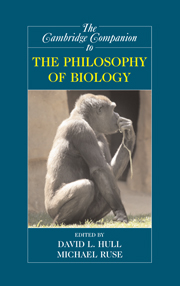Book contents
- Frontmatter
- 1 Adaptation
- 2 Population Genetics
- 3 Units and Levels of Selection
- 4 What’s Wrong with the Emergentist Statistical Interpretation of Natural Selection and Random Drift?
- 5 Gene
- 6 Information in Biology
- 7 Reductionism (and Antireductionism) in Biology
- 8 Mechanisms and Models
- 9 Teleology
- 10 Macroevolution, Minimalism, and the Radiation of the Animals
- 11 Philosophy and Phylogenetics: Historical and Current Connections
- 12 Human Evolution: The Three Grand Challenges of Human Biology
- 13 Varieties of Evolutionary Psychology
- 14 Neurobiology
- 15 Biological Explanations of Human Sexuality: The Genetic Basis of Sexual Orientation
- 16 Game Theory in Evolutionary Biology
- 17 What Is an ‘Embryo’ and How Do We Know?
- 18 Evolutionary Developmental Biology
- 19 Molecular and Systems Biology and Bioethics
- 20 Ecology
- 21 From Ecological Diversity to Biodiversity
- 22 Biology and Religion
- 23 The Moral Grammar of Narratives in History of Biology: The Case of Haeckel and Nazi Biology
- Reference List
- Index
- Series List
7 - Reductionism (and Antireductionism) in Biology
Published online by Cambridge University Press: 28 April 2008
- Frontmatter
- 1 Adaptation
- 2 Population Genetics
- 3 Units and Levels of Selection
- 4 What’s Wrong with the Emergentist Statistical Interpretation of Natural Selection and Random Drift?
- 5 Gene
- 6 Information in Biology
- 7 Reductionism (and Antireductionism) in Biology
- 8 Mechanisms and Models
- 9 Teleology
- 10 Macroevolution, Minimalism, and the Radiation of the Animals
- 11 Philosophy and Phylogenetics: Historical and Current Connections
- 12 Human Evolution: The Three Grand Challenges of Human Biology
- 13 Varieties of Evolutionary Psychology
- 14 Neurobiology
- 15 Biological Explanations of Human Sexuality: The Genetic Basis of Sexual Orientation
- 16 Game Theory in Evolutionary Biology
- 17 What Is an ‘Embryo’ and How Do We Know?
- 18 Evolutionary Developmental Biology
- 19 Molecular and Systems Biology and Bioethics
- 20 Ecology
- 21 From Ecological Diversity to Biodiversity
- 22 Biology and Religion
- 23 The Moral Grammar of Narratives in History of Biology: The Case of Haeckel and Nazi Biology
- Reference List
- Index
- Series List
Summary
Accelerating developments in molecular biology since 1953 have strongly encouraged the advocacy of reductionism by a number of important biologists, including Crick, Monod, and E. O. Wilson, and strong opposition by equally prominent biologists, especially Lewontin, along with most philosophers of biology.
Reductionism is a metaphysical thesis, a claim about explanations, and a research program. The metaphysical thesis that reductionists advance (and antireductionists accept) is physicalism, the thesis that all facts, including the biological facts, are fixed by the physical and chemical facts; there are no nonphysical events, states, or processes, and so biological events, states, and processes are “nothing but” physical ones. This metaphysical thesis is one reductionists share with antireductionists. The reductionist argues that the metaphysical thesis has consequences for biological explanations: they need to be completed, corrected, made more precise, or otherwise deepened by more fundamental explanations in molecular biology. The antireductionist denies this inference, arguing that nonmolecular biological explanations are adequate and need no macromolecular correction, completion, or grounding. The research program that reductionists claim follows from the conclusion about explanations can be framed as the methodological moral that biologists should seek such macromolecular explanations.
- Type
- Chapter
- Information
- The Cambridge Companion to the Philosophy of Biology , pp. 120 - 138Publisher: Cambridge University PressPrint publication year: 2007
- 9
- Cited by

